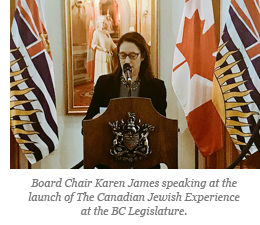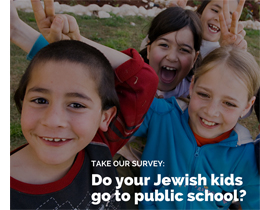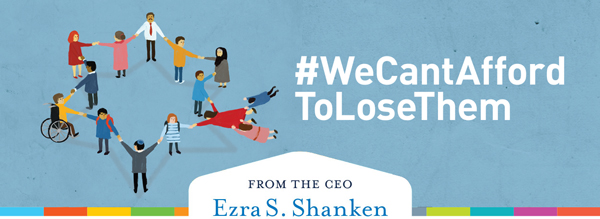This message has 785 words and will take about 4 minutes to read.
 This week was one of looking back and looking ahead, starting with the Victoria launch of The Canadian Jewish Experience on Monday. We were honoured to be part of this event alongside our advocacy partner, The Centre for Israel and Jewish Affairs, Premier John Horgan, Minister Selina Robinson, Speaker Darryl Plecas, and approximately 40 MLAs including Michael De Jong, who also spoke at the event. Many thanks to Tova Lynch who spoke and is the brains behind the CJE exhibit. Karen James, our Board chair, spoke at the launch and used the opportunity to illuminate for them the challenges and opportunities that exist for our community and what they can do to impact our future. This week was one of looking back and looking ahead, starting with the Victoria launch of The Canadian Jewish Experience on Monday. We were honoured to be part of this event alongside our advocacy partner, The Centre for Israel and Jewish Affairs, Premier John Horgan, Minister Selina Robinson, Speaker Darryl Plecas, and approximately 40 MLAs including Michael De Jong, who also spoke at the event. Many thanks to Tova Lynch who spoke and is the brains behind the CJE exhibit. Karen James, our Board chair, spoke at the launch and used the opportunity to illuminate for them the challenges and opportunities that exist for our community and what they can do to impact our future.
She also noted that we are continuing the work of generations that came before us as we strive to ensure that every member of our community is engaged, connected and supported. Of course, how we do that looks different today than it did, say, during the Gold Rush in the 1880s when BC’s Jewish communities first started to take shape.
One change we have seen over the past decade in our community, and in communities across North America, is a shift in the Jewish education options families are choosing.
Our community is fortunate to have some very robust part-time (supplementary) Jewish education options, in which approximately 320 children are enrolled. We see many exciting examples of innovative programming offered by the eight supplementary programs that we fund through the Federation Annual Campaign.
Yet across North America there has been a drop in enrolment in supplementary Jewish education programs, and a growing number of families are not involving their children in any form of structured Jewish education. That is not a reflection of the quality of current options, which we know are of tremendous value, but rather of the changing needs of some families who are looking for a broader variety of options, ranging from style of instruction to location to timing. Why? Quite simply the landscape has changed. Over 30% of local Jewish children live in communities with few or no nearby options; family life has become increasingly complex and busy; and denominationally specific education is not always a family’s preference. Our Jewish Education Task Force identified a number of underserved populations, including interfaith families, secular families, Israeli families, and families living in the regional communities, all of whom have differing needs and interests.
The task force recommended a multi-pronged strategy to nurture innovation, support new options, and better support existing options. Thanks to a very generous donor who has pledged support for innovative supplementary Jewish education programs, we are able to do just that.
 One priority is to identify and implement programs for Jewish and interfaith families whose children are enrolled in public schools. We worked with a market research company to design this survey to better understand the options that interest these families. One example is combining after-school care in public school settings with supplementary Jewish education. Another option might be to provide transportation from public schools to a central location for an after-school program. One priority is to identify and implement programs for Jewish and interfaith families whose children are enrolled in public schools. We worked with a market research company to design this survey to better understand the options that interest these families. One example is combining after-school care in public school settings with supplementary Jewish education. Another option might be to provide transportation from public schools to a central location for an after-school program.
If you have children in the public school system or if you do not see existing supplementary programs as the right fit for your family, I encourage you to complete the survey. Whether this describes you or not, please pass it along to friends and family whose voices should be heard.
We are also launching several other initiatives to support increased innovation in existing supplementary school programs. These include the new Supplementary School Innovation Grants designed to help programs retain students and/or expand their reach; funding for professional development focused on incorporating innovation in the classroom; and additional support for some of the smaller supplementary schools or non-traditional programs. We will also be issuing a call for proposals to develop a community-based education program for native Hebrew speakers.
Part of the role of our Jewish Federation is to work with our partners and stakeholders to plan for the future, to collaborate with them to respond to changes in what the community is looking for, and to raise financial resources to support shifts that are typically beyond the scope of any single program provider.
It isn’t always easy to embrace change, but at the end of the day our collective ability to adapt to evolving community needs while maintaining our core values and traditions is what has kept this community thriving over the decades and centuries. Keeping community members engaged, connected and supported is naturally going to look different now compared to years ago, or even to yesterday. As our community continues to evolve, the generations that come after us will find their own ways to address community needs, and one day those efforts will be led by the very children we will engage with a broader range of supplementary Jewish education options today.
Shabbat shalom,
Ezra S. Shanken
CEO,
Jewish Federation of Greater Vancouver |

